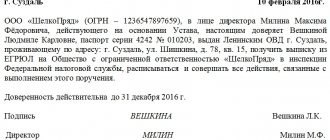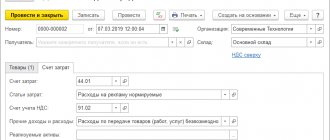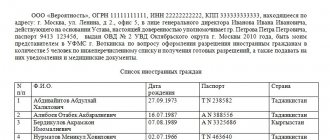In order for an employee to have the right to receive goods from a supplier on behalf of the company, the manager must draw up a power of attorney form to receive material assets (Form M-2) .
Get the form for free!
Register in the online document printing service MoySklad, where you can: completely free of charge:
- Download the form you are interested in in Excel or Word format
- Fill out and print the document online (this is very convenient)
A power of attorney to receive inventory items is drawn up on the basis of an agreement concluded with the supplier: on delivery, purchase and sale, etc.
Main features of a power of attorney
A power of attorney has these features:
- Written form . Often the paper must be certified by a notary. The need for assurance depends on the status of the principal.
- One-sided deal . This is a unilateral transaction, as a result of which the principal receives a number of powers.
- Urgency . This is an urgent document. That is, it has a validity period (Article 186 of the Civil Code). If a document does not have a term, it loses its legal force after 1 year from the date of creation. If a document does not contain a date of execution, it is considered void.
- Two participants . There are 2 parties involved in the transaction: the principal (the person transferring powers) and the trustee (the person receiving powers).
If a document does not have the listed characteristics (for example, the agreement is not concluded in writing), it will not have legal force.
Does the document need to be notarized?
Article 185.1 of the Civil Code specifies cases when a power of attorney must be certified by a notary:
- The powers will be used in transactions involving a notarial form. For example, a real estate seller delegates the authority to sell a home to a third party. In this case, the power of attorney must be certified.
- Based on the document, authority to submit applications for state registration of rights/transactions is transferred.
- The document transfers rights that are registered in state registers.
There are powers of attorney that are equivalent to notarial ones. Accordingly, such documents do not need to be certified by a notary. The types of such securities are contained in Part 2 of Article 185.1 of the Civil Code. In particular, nothing needs to be certified if the document is issued by a company:
- where does the principal work;
- where does he study;
- where he is being treated.
If a power of attorney is issued on behalf of a legal entity, it does not need to be certified by a notary. The signature of the manager or persons who have the right to sign according to the company’s Charter is sufficient.
When certified by a notary
Not all powers are transferred by citizens and organizations without the participation of a notary. Government bodies, as a rule, interact only with notarized representatives. Compulsory identification is required for:
- making transactions requiring a notarial form (purchase and sale of real estate);
- filing applications for state registration of rights or transactions (car registration);
- disposal of rights or property registered in state registers.
A typical example of a notarized power of attorney from an individual to an individual for the sale of an apartment looks like this:
Mandatory certification is subject to the involvement of a representative for:
- receiving pensions and benefits from the Pension Fund of Russia (free certificate);
- receiving valuable correspondence.
Such instructions to representatives have the right to be certified not only by a notary, but also by other authorized bodies and officials.
Types of powers of attorney
The main types of documents transferring powers:
- One-time . Provided for the purpose of a third party performing a specific action. For example, on the basis of a power of attorney, a representative can only sign the purchase and sale agreement. The document can no longer be used.
- Special . On the basis of such a power of attorney, the representative can perform similar operations during the agreed period of validity of the document.
- General . On the basis of such a power of attorney, the representative can perform all necessary actions related to the disposal of the principal’s property. That is, on the basis of this document, the representative receives an expanded list of rights.
A general power of attorney is a special type of document. It can only be issued to a person on whom the principal can completely rely. The risk that the representative may betray trust must always be taken into account. Based on a general power of attorney, a person receives exclusive powers. Therefore, the risk of abuse is high.
Types of documents by type of authority granted
On the basis of a power of attorney, general or exclusive powers can be granted. Let's consider the general powers within the framework of office work (Article 35 of the Code of Civil Procedure, Article 41 of the Arbitration Procedure Code, Article 45 of the CAS):
- Familiarization with the case materials.
- Making extracts and making copies.
- Providing evidence.
- Participation in the study of the evidence presented.
- Statement of petitions.
Exclusive powers within the framework of legal proceedings (Article 54 of the Code of Civil Procedure):
- Signing the claim and filing it in court.
- Referring the dispute to arbitration.
- Submitting a counterclaim.
- Changing the scope of claims in a claim.
- Drawing up a settlement agreement.
- Appealing decisions.
General powers are understood as powers that do not need to be separately enshrined in a power of attorney. If these are exclusive powers, the list of them must be indicated verbatim. If they are not specified, the representative will not be able to use them.
Simple written form
We have found that it is permissible to transfer rights or powers to someone without official identification if you are sure that there is no legal requirement. This is the difference between a simple form and a notarial one.
They are different not only in essence, but also in form. The notary certificate is issued on a uniform form. A simple one is written on a regular sheet of paper. Some even exchange them electronically. How to write a power of attorney for another person depends on the situation and the requirements of the transaction. There are clearly established criteria for such cases, and they should be followed even in the absence of a strict form.
Notarization is a paid service. The collection rate is stated at the bottom of the form. A simple written form of delegation of authority is free for the principal and representative. But you can avoid expenses if you draw it up correctly.
ConsultantPlus experts examined the procedure for receiving an insurance pension and a fixed payment to an insurance pension at home and by proxy. Use these instructions for free.
Contents of the document
The content of the power of attorney depends on its type. But, as a rule, the document contains these details:
- Date of issue of the document. From this time the validity period of the document is counted.
- Information about the principal. Full name, date of birth, passport details.
- Representative information. Full name and passport details.
- The powers vested in the representative.
- Representative signature sample.
- Validity period of the document.
- Signature of the principal.
Sometimes the document indicates the possibility of reassignment. Involves the transfer of powers from one representative to another.
Sample of filling out power of attorney M2 for receiving inventory materials
The power of attorney is drawn up in a single copy.
The standard interindustry form M2 has two parts: a tear-off coupon and a main table. Let's take a closer look at how to fill them out.
Power of attorney to receive goods from an organization: sample of filling out the first part
First, fill out the first, tear-off part. Please indicate in it:
- power of attorney number, date of preparation and validity period,
- to whom it was issued: full name of the employee and his position,
- the name of the organization where the document must be presented,
- number and date of the order and document confirming the execution of the entrusted action.
This part of the power of attorney to receive inventory items must be signed by the employee to whom the document was issued. She stays with the accountant.
Standard interindustry form M2: filling out the second part
In the second part of the document, indicate:
- name of the principal company, address, account number and bank information,
- power of attorney number, date of issue and expiration date,
- Full name, position and passport details of the employee who will work on the basis of this power of attorney,
- name of the supplier company and information about the document on the basis of which goods and materials are issued.
See our example of filling out the M2 power of attorney to receive inventory items - it contains all the necessary fields.
Next, fill out the table, indicating in it all the goods and materials that an employee can receive. It is necessary to note their number, name, unit of measurement and quantity.
The document must be signed by the head of the granting company, the chief accountant and the employee for whom the power of attorney was issued.
The validity period of the power of attorney to receive inventory items in form M-2 is no more than two weeks. After 15 days, the document loses its relevance, but the tear-off coupon is retained in the accounting department.
Who has the right to delegate powers?
Both legal entities and ordinary citizens can be trusted to carry out certain actions. The Civil Code provides for certain requirements for individuals who can draw up a power of attorney (Articles 21, 27):
- full legal capacity;
- minors aged 14 to 18 years - exclusively within the limits of their rights.
From a legal point of view, such a document is a unilateral transaction, therefore the rules provided for such agreements apply to powers of attorney.
Power of attorney to represent interests in court: features
When issuing a power of attorney for representation in court, you need to understand what kind of legal process it is intended for: arbitration, civil, administrative, etc. In the arbitration court, a representative without special instructions in the power of attorney will not be authorized to:
- To sign a claim (or a response to a filed claim),
- Will not be able to ask for security, for the transfer of the case to arbitrators,
- Does not have the right to renounce the claim or recognize the claim brought against the principal, change the claim,
- Conclude a settlement agreement
- Delegate your powers
- Request a review of the case
- Appeal against court decisions
- Receive funds.
In civil proceedings, the features of special powers are similar, but separately it is required to indicate the possibility of filing a claim in the court itself, as well as presenting executive documents for execution.
REFERENCE. From October 1, 2019, the principal will be required to notify the court if the previously issued authority is revoked, as amended in Art. 54 Code of Civil Procedure of the Russian Federation.
The power of attorney for representation of interests in court must include information about the possibility of reassignment. If this is excluded, then this must also be indicated.
In modern Russia, relations of representation acquire special significance. This is due to the development of market relations, reform of legislation, and expansion of the sphere of civil relations.
The legal relations between the representative and the represented, as well as the formalization of their powers, are regulated by Chapter 10 of the Civil Code of the Russian Federation (hereinafter referred to as the Civil Code of the Russian Federation).
The legal relationship of representation is the legal relationship between the represented and the representative, the content of which is the authority of the representative. Due to this, one person with the appropriate powers (representative) makes transactions on behalf of another person (represented), as a result of which the latter acquires, changes and terminates civil rights and obligations.
The grounds for the emergence of representation are the legal facts with which civil law connects the emergence of legal relations of representation between the subjects of representation, or, in other words, the legal facts with which the law connects the recognition of one person as a representative of another person. The legislator in paragraph 1 of Art. 182 of the Civil Code of the Russian Federation establishes the following legal facts that are the grounds for the establishment of a representative office: power of attorney, indication of the law, act of an authorized state body or local government body. A transaction completed by a representative directly creates, changes or terminates the civil rights and obligations of the represented person, provided that the representative had the appropriate authority. Power is the right granted in accordance with the procedure established by law to one person to enter into transactions on behalf and in the interests of another person as his representative. The legislator determined that the powers of a representative can be defined in a power of attorney. So, in accordance with Art. 185 of the Civil Code of the Russian Federation, a power of attorney is a written authority issued by one person to another person for representation before third parties.
The word “power of attorney” is the same root as “trust” and “entrust.” The presence of trust, however, does not exclude dishonest behavior of the representative. The task of protecting the rights of the person who issued the power of attorney is solved by the norm of paragraph 3 of Art. 182 of the Civil Code of the Russian Federation, namely the direct prohibition established in it.
In accordance with paragraph 3 of Art. 182 of the Civil Code of the Russian Federation, a representative cannot make transactions on behalf of the represented person in relation to himself personally. He also does not have the right to carry out similar transactions in relation to another person, whose representative he is also at the same time, with the exception of cases of commercial representation. Transactions of this kind are void.
For example, one of the spouses cannot act as a representative under the power of attorney of the represented third party and on his behalf acquire property in the name of his spouse, since the property of the spouses is joint property, unless otherwise provided by the marriage contract (Article 33 of the Family Code of the Russian Federation), therefore, in this case, the transaction will be completed by the representative in his personal interests, i.e. in relation to yourself personally.
However, it is necessary to distinguish between cases when a representative can make a transaction on behalf of the represented person and on his own behalf if their interests coincide. For example, when a representative acts on behalf of the represented person and on his own behalf while simultaneously alienating their shares in the right of common shared ownership of property. In this case, both parties to the transaction have a common goal - to sell profitably the property that is in their common shared ownership, and their interests coincide.
As noted in the Concept for the Development of Civil Legislation of the Russian Federation (approved by the decision of the Council under the President of the Russian Federation for the codification and improvement of civil legislation dated 07.10.2009): “The norm on transactions of a representative in relation to himself personally or in relation to a person whose representative he is at the same time (p 3, Article 182 of the Civil Code), has been widely used in practice and, as a rule, such transactions are declared void by the courts. At the same time, this provision is aimed solely at protecting the interests of the represented person from possible infringement of them by the representative in conditions of a conflict of interest. The nullity of such a transaction should be considered an unnecessarily harsh consequence of the violation.
Clause 3 of Art. should be supplemented. 182 of the Civil Code of the Russian Federation indicating that the person represented, in advance or after the conclusion of the transaction by the representative, in relation to himself personally or in relation to the person whose representative he is at the same time, can express consent to the specified transaction.
Here it is necessary to provide that a transaction made in violation of the interests of the represented person, contrary to the restrictions established by this paragraph, may be declared invalid at the request of the represented person.
Thus, the choice of a representative, his conscientiousness when making transactions, these are the main guarantees of the protection of the rights and interests of the represented person.
Chief specialist-expert state registrar A.A. Borodaenko
Accompanying a child by non-parents throughout the country
Another life situation when you need to know how to write a power of attorney is a child going on vacation, but without his parents. For example, his grandmother took him to her village or his teachers organized a trip to a sports camp. If the child will not cross the border of the Russian Federation, then there is no point in contacting a notary; the document can be drawn up by hand. At the legislative level, there is no requirement for the mandatory preparation of a trust document. But having a power of attorney will allow you to safely board the train and check into a hotel. Guides have the right to check documents, just as hotel employees can request them upon check-in.
Sample of filling out a power of attorney by hand:
“The title of the document, date and place of preparation.
We, full name, passport details and place of residence of both parents, trust (personal data of the authorized person for escort, indicating passport details) to accompany a minor son or daughter - full name. (in full words), birth certificate data (passports, if available), date of birth, for the territory of the Russian Federation (specific regions can be registered).
As part of the performance of the assigned powers, the authorized person is allowed to represent the interests of the child in government bodies and other structures, and bear responsibility for his life and health.
The power of attorney was issued for the period from... to..."
When can a power of attorney be issued from a legal entity to an individual?
A power of attorney is a document that gives a representative the authority to perform actions on behalf of the principal.
Legal entities can issue powers of attorney for both organizations and individuals - there are no restrictions. A document can be issued to convey any legal authority, for example:
- to carry out the procedure for registering a company with the tax authorities;
- execution of contracts with legal entities or individuals;
- submitting reports to regulatory authorities;
- representing the interests of the organization in the courts;
- carrying out the procedure for registering real estate in Rosreestr or a vehicle in the traffic police;
- receiving mail at post offices;
- opening bank accounts;
- sending and receiving material assets;
- representation of interests in the Federal Tax Service, the Ministry of Internal Affairs, customs and other government agencies.
A power of attorney can be issued for any transactions not prohibited by law.
ConsultantPlus has ready-made solutions, including how to issue a judicial power of attorney to represent the interests of a legal entity. If you do not yet have access to the K+ system, obtain it for free on a temporary basis. You can also get the current K+ price list.









